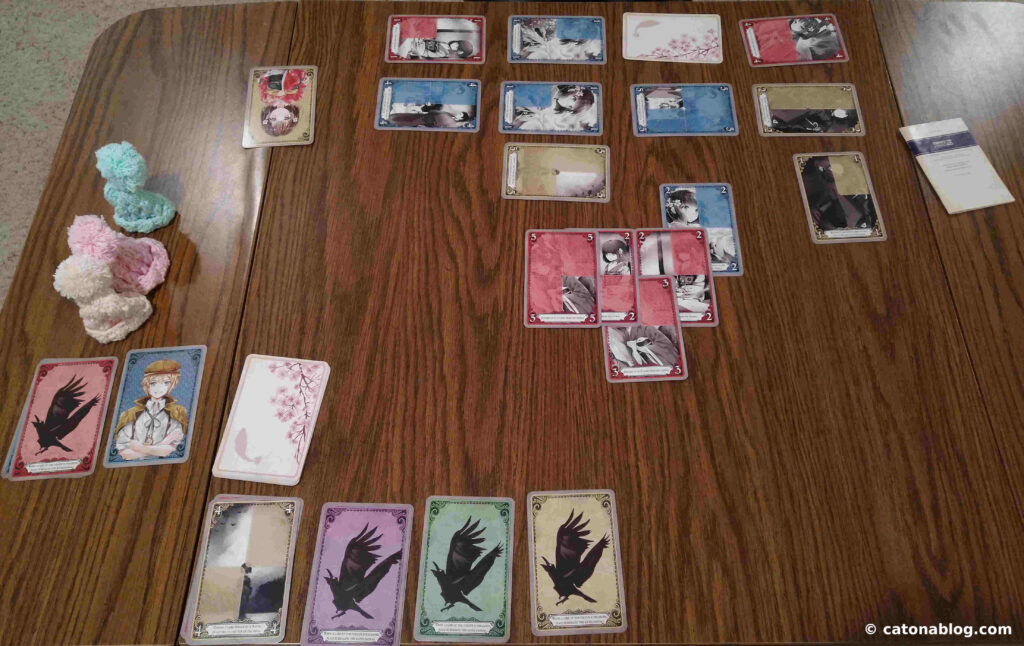
Feb 18th, 2022 Friday Cloudy and Windy
My husband and I recently won a supposedly very challenging two-player cooperative card game, called “the ravens of thri sahashri”. The goal of the game is to help a girl “Ren” whose memories are being attacked by ravens to restore her memories. This is achieved by the boy “Feth” arranging memory cards into the “atman” (the pile of cards in the middle of the table) in a strategical way so that Ren can select the cards she needs to complete a poem (i.e. the numbers on the cards add up to a certain number for each row) together with the heart cards she already has. When the poem is completed, only cards of the same colors as Ren’s heart cards are allowed to be in the atman.
It does not sound that complicated, but here is the catch: like many other cooperative games with a limited communication element, Ren and Feth cannot communicate in any way other than specified in the rule (e.g. flip a card when a certain condition is met), and Feth does not get to see Ren’s heart cards, so he has to guess what cards Ren might need.
When we were playing the game, there were many times that I, playing the role of Ren, thought to myself (since I obviously could not think aloud), “we already win, IF ONLY he knows which of these cards currently on the table I need – but of course he does not know, so we’ll have to see.” As it turns out, the game would be so easy that we may quickly get bored if we have telepathy skills 😛 It is because of this communication challenge that the game is difficult and interesting at the same time.
This type of limited communication games (e.g. hanabi, codename) seem to be trendy now. At first, I suppose that people must like them because the limitation in games makes the “limitless” straightforward communication in every day feel like a piece of cake, thus help people appreciate the beauty of being able to communicate freely. However, I come to realize that, in many situations, it is the complete opposite. Why is that?
In a game that clearly sets barriers for communication, when things are going well as if the other side can somehow read our mind, people feel happy and grateful. When the communication is not as effective as we hoped, we attribute that failure to the very salient communication barrier (i.e. the game rule), and not to ourselves or the recipient. In contrast, when the communication is not going smoothly in real life, we tend to blame ourselves and/or the recipient “why can’t you understand me”. After all, there is no game rule dictating how communication should be done, so it should be easy, right?
Or maybe not?
In “the ravens of thri sahashri”, even though Ren and Feth cannot directly talk, they both know what the other person is trying to achieve. Feth knows that Ren needs to make a poem with cards summing up to a certain number, and she does not want colors unseen in her heart cards to be in the atman at the end of the game. This knowledge can help him interpret Ren’s behaviors (e.g. discard certain cards from the atman). In real life, rarely do we enjoy this clarity about other people’s goals, intentions, or motivations, so other people’s behaviors and words can be ambiguous to interpret. When a guy complimented your baking skills after tasting your apple pie, was he trying to court you? Was he trying to get you to bake more desserts for him (because he loves eating 😛 )? Was he thinking about hiring you as a pastry chef? Was he just being nice because no one else seems to care for the apple pie?
I know the example sounds silly, but when I think back to all the communication encounters I had just yesterday, I am shocked to find that nearly all of them can be interpreted differently depending on the intentions and goals of the communicators, which I had no idea of. What if my original interpretation was wrong? Usually I never get to find out what the correct interpretation should be, unless I directly check with the communicator (“when you said my apple pie tasted good, were you just being nice?”), resulting in a somewhat awkward conversation that people apparently do not engage in very much. So we carry on with whatever interpretation we decide upon, and the other people get to be on the guessing table too. If we all get it REALLY wrong, we might eventually find out, but then we would scratch our heads to figure out “where did the miscommunication happen?” “why did he think that I meant that?” “what exactly did I say or do that suddenly gives her the wrong impression?”
You see, compared to all this uncertainty and ambiguity, the world in games is much simpler. At least, we receive feedback immediately, and no hard feelings from failed communication during games should hurt relationships in real life.